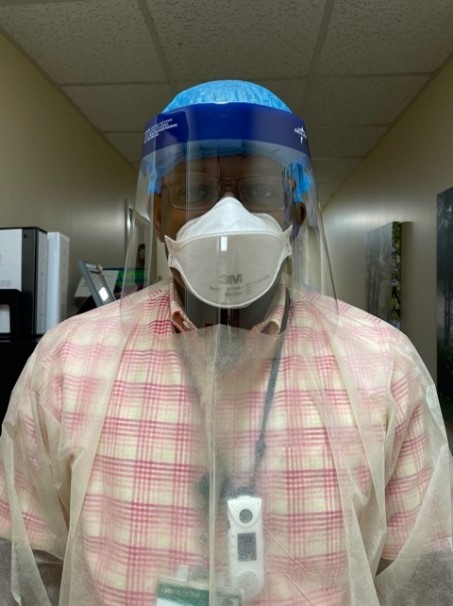A Reflection by Rev. Dr. Rodney Franklin

I serve as a staff chaplain at UAB Hospital in Birmingham, Alabama with other chaplains and resident chaplains. I am the on-call chaplain, working 3:00-11:00 p.m., covering the Heart Lung Transplant Intensive Care Unit, Bone Marrow Transplant, and Generalist floors, and responding to any code blue medical emergencies that happen during my shift and to pager requests from patients and staff who need to see a chaplain.
When the hospital started receiving COVID patients, chaplains were not visiting patient rooms but communicating with them by telephone and video calls. An iPad would be rolled into the patient’s room for a call. When we were able to secure more personal protective equipment (PPE), we were allowed to visit patients in their rooms.
In an intensive care unit, I was serving holy communion to Linda, a COVID patient with pecan brown skin, silver hair, and a soft voice. This visit was unique because I was dressed in my yellow gown, blue head covering, face shield, N95 mask, and rubber gloves. I didn’t know that some of my last words to Linda would be, “let us commune together.” I had been visiting Linda for several weeks and hoping she would get better. During her stay, she requested communion and I brought it to her on a Sunday, which would turn out to be the last time we would share the bread and cup. A few days later she was put on a ventilator because her breathing became difficult without support. She never recovered, and later died.
COVID has prevented families from visiting the hospital and patients can feel isolated. Thank God some bring their cell phones so they can FaceTime with their families or talk to them on the phone. However, there is nothing like having a face-to-face conversation with your loved one. My colleagues and I have been very deliberate about our visits with COVID patients so that they do not feel isolated and disconnected from the outside world.
Becoming more intentional
Visiting COVID patients in the hospital made my visits more intentional. When I visit patients, I wear PPE and when I go home, there is again an intentionality about clothes going in a bag and shoes sprayed so that the virus does not take residence where I live.
Another difference in practicing pastoral care during the pandemic is how we have been more intentional with patient’s families by checking in with them. This intentionality of care is not just with patients but also with staff.
The pandemic has affected staff. Staff have experienced a cruel cycle of care. They begin each day caring for patients who are initially responsive, but who may later they be put on a ventilator, or even die. The other chaplains and I check in with them to ask how they are caring for themselves as they care for patients.
The importance of self-care
Self- care is important in ministry and can at times be forgotten when caring for others, especially during the pandemic. When COVID came to our area, the gym that I work out in was forced to close, so I would do some walking/jogging in my neighborhood. I also attempted to watch what I ate, but what do you do when it feels like the BBQ joint is calling your name—”Rodney, come take home a slab of small end ribs!” My goal is to eat a healthy diet, and I strive for a good balance. I am thankful to former UCBMA Director the Rev. Gayle Engel, who shared how mindfulness has been helpful to him and his wife. I have used it as a way of focused listening to the Spirit and being silent.
Agility, collaboration, and compassion
As Chair of the Board during the pandemic, it has been challenging to not meet in person but by Zoom. All our meetings over the past year and a half—2020 and 2021 Annual Meetings, committee meetings, UCBMA, and the full Board—have been by Zoom. It is one thing to see a facial expression over a computer screen and another to be next to a person and see their body language respond to an action or thought someone is relaying during conversation. Zoom has not hampered our work; it has increased our intentionality in how we function and carry out our responsibilities as a Board. Our ongoing work with Brian and the staff during the pandemic has been very positive; they have assisted us with technology and other concerns as we continue to function as a board. The PBUCC team was very forward thinking in making sure that COVID did not become a crisis but an opportunity to continue the high level of service to those who have served and are serving the church. It shows how adaptable Board and staff have been.
While COVID has presented challenges and loss, the gift of providing pastoral care to someone like Linda during my communion visit reminds me how Christ demonstrated the importance of caring for people in community, no matter the crisis.
